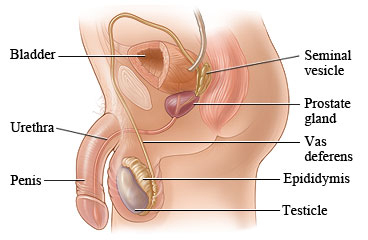
Overview
Testicular cancer occurs when cancer cells grow in the tissues of one or both testicles. The testicles are male sex organs that make and store sperm. They also make the male sex hormone testosterone. Testicular cancer is one of the most curable types of cancer.
Treatment involves surgery to remove the affected testicle. You may also have radiation or chemotherapy. Some people will have surgery to remove cancer that has spread to other parts of the body, such as to lymph nodes.
Follow-up care is a key part of your treatment and safety. Be sure to make and go to all appointments, and call your doctor if you are having problems. It's also a good idea to know your test results and keep a list of the medicines you take.
How can you care for yourself at home?
- Take your medicines exactly as prescribed. Call your doctor if you think you are having a problem with your medicine.
- Eat healthy food. If you do not feel like eating, try to eat food that has protein and extra calories to keep up your strength and prevent weight loss. Drink liquid meal replacements for extra calories and protein. Try to eat your main meal early.
- Get some physical activity every day, but do not get too tired.
- Get enough sleep and take time to do things you enjoy. This can help reduce stress.
- Think about joining a support group. Or discuss your concerns with your doctor, counselor, or other health professional.
- If you are vomiting or have diarrhea:
- Drink plenty of fluids to prevent dehydration. Choose water and other clear liquids. If you have kidney, heart, or liver disease and have to limit fluids, talk with your doctor before you increase the amount of fluids you drink.
- When you are able to eat, try clear soups, mild foods, and liquids until all symptoms are gone for 12 to 48 hours. Other good choices include dry toast, crackers, cooked cereal, and gelatin dessert, such as Jell-O.
- Take care of your urinary tract to prevent problems such as infection. Limit drinks with caffeine, drink plenty of fluids, and urinate every 3 to 4 hours.
- If you have not already done so, prepare a list of advance directives. Advance directives are instructions to your doctor and family members about what kind of care you want if you become unable to speak or express yourself.
When should you call for help?
Call 911 anytime you think you may need emergency care. For example, call if:
- You passed out (lost consciousness).
Call your doctor now or seek immediate medical care if:
- You have a fever.
- You have abnormal bleeding.
- You have new or worse pain.
- You think you have an infection.
- You have new symptoms, such as a cough, belly pain, vomiting, diarrhea, or a rash.
Watch closely for changes in your health, and be sure to contact your doctor if:
- You notice any change in a testicle.
- You are much more tired than usual.
- You have swollen glands in your armpits, groin, or neck.
- You do not get better as expected.
Where can you learn more?
Go to http://www.healthwise.net/patientEd
Enter F366 in the search box to learn more about "Testicular Cancer: Care Instructions".
Current as of: October 25, 2024
Author: Ignite Healthwise, LLC Staff
Clinical Review Board
All Ignite Healthwise, LLC education is reviewed by a team that includes physicians, nurses, advanced practitioners, registered dieticians, and other healthcare professionals.

